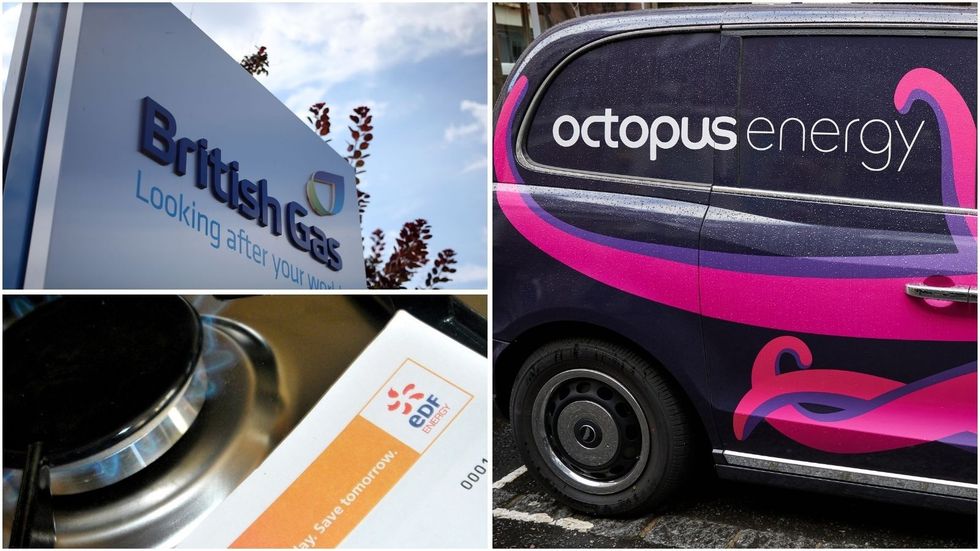British Gas, OVO, EDF, and Octopus customers warned of 'common mistakes' costing you £1,480 on energy bills

Britons can take practical steps to reduce their energy consumption and save on their bills
Don't Miss
Most Read
Millions of households across Britain are warned that "common heating mistakes" could be costing them up to £1,480 a year, according to industry specialists.
Households using major suppliers such as British Gas, OVO, EDF and Octopus are particularly at risk of these unnecessary expenses.
The alert comes as energy bills continue climbing, with recent price cap adjustments adding further pressure to family budgets.
Gareth Whitehill, renewable energy consultant from Grant Store has identified seven common household mistakes that significantly drive up heating costs.
"We see the same faults time and again," Mr Whitehill explained. "From inefficient boilers to wrongly positioned thermostats, these small errors add up to hundreds of pounds a year in wasted energy. With prices edging higher again, families can't afford to ignore them."
The energy regulator Ofgem has implemented a two per cent increase to the price cap, raising it from £1,720 to £1,755 for standard dual-fuel households using direct debit payments.
TRENDING
Stories
Videos
Your Say
This adjustment, which took effect on October 1, 2025, means typical families face an additional £35 on their yearly energy expenses.
The timing of this increase coincides with growing concerns about household heating efficiency as winter approaches. Energy specialists indicate that addressing common heating problems could help offset these rising costs and potentially save much more.
Simple tweaks to home heating systems could more than offset the recent rise in energy prices. Many households are losing money each winter because of small but costly issues, from skipped maintenance to poorly installed equipment.
One of the biggest mistakes is neglecting an annual boiler service.

Customers at various energy suppliers could make their own savings to save on the price cap hike
| PASkipping it can cut efficiency by around 15 per cent, meaning your boiler burns more gas to produce the same amount of heat. That extra fuel use quickly adds up, leaving households paying far more than necessary.
"That works out at around £260 wasted every year," Mr Whitehill said. "By comparison, a service costs less than half of that, and it can also prevent breakdowns that lead to expensive repairs. It's one of the simplest investments you can make in your home."
Thermostat positioning presents another significant issue affecting heating efficiency. When placed near radiators or in draughty corridors, these devices provide inaccurate temperature readings, causing systems to shut down prematurely or operate unnecessarily.
"This kind of misplacement can add around 10 per cent to your bill, or about £175 a year for the average household. Moving the thermostat to a central, neutral location helps the system read the true temperature and heat the home more efficiently."
LATEST DEVELOPMENTS
 Households are looking for ways to cut their energy bills this winter | GETTY
Households are looking for ways to cut their energy bills this winter | GETTYAccumulation of debris and rust within radiators creates another expensive problem for homeowners. This internal buildup, commonly called sludge, prevents proper hot water circulation and forces boilers to operate longer to achieve desired temperatures.
Mr Whitehill added: "We've seen homes lose 20-25 per cent efficiency due to sludge in radiators. For an average family, that's nearly £400 a year wasted until the system is professionally flushed. It's particularly common in older properties with ageing pipework."
Leaking hot water taps represent a surprisingly costly oversight. A single dripping tap can waste approximately 5,500 litres of heated water annually, equivalent to filling 70 baths.
"The cost works out at around £70 a year for no benefit at all. Fixing a drip is quick, inexpensive, and immediately stops the waste."
Incorrectly sized boilers present another financial drain, particularly in smaller properties. When boilers exceed a home's requirements, they constantly switch on and off, consuming excess fuel and accelerating wear.
"We've seen households overspend by £150-£200 a year purely because the boiler wasn't specified correctly when installed. Getting the right size makes the system smoother, cheaper, and longer-lasting."
Imbalanced heating systems create temperature disparities between rooms, prompting residents to increase thermostat settings unnecessarily. This overcompensation leads to excessive heating in already warm areas.
 Britons could save money on energy bills | GETTY
Britons could save money on energy bills | GETTY "Rebalancing ensures every radiator receives the right amount of hot water. Once corrected, most households can turn the thermostat down by one or two degrees instantly saving £100-£200 a year."
Outdated timer settings often heat empty properties, with forgotten schedules potentially adding £250 to annual bills.
How to save on your heating bills
- Book an annual boiler service – Skipping a service can cut efficiency by 15 per cent, wasting around £260 a year in extra gas.
- Check thermostat placement – A poorly positioned thermostat can add about £175 a year to your bill. Keep it in a central spot, away from radiators or draughts.
- Flush radiators to remove sludge – Built-up rust and dirt can reduce efficiency by 20–25 per cent, costing households around £400 a year.
- Fix dripping hot taps – A single leaking tap can waste 5,500 litres of heated water annually, adding roughly £70 a year to costs.
- Ensure the boiler is the right size – Oversized boilers waste fuel by constantly turning on and off. Correct sizing can save about £175 a year.
- Balance the heating system – Evenly distributing heat allows most homes to turn the thermostat down a degree or two, saving £150 a year.
- Check timer settings – Outdated schedules can mean heating empty rooms, wasting up to £250 a year.
Together, these adjustments could save the average household around £1,480 annually,
More From GB News










